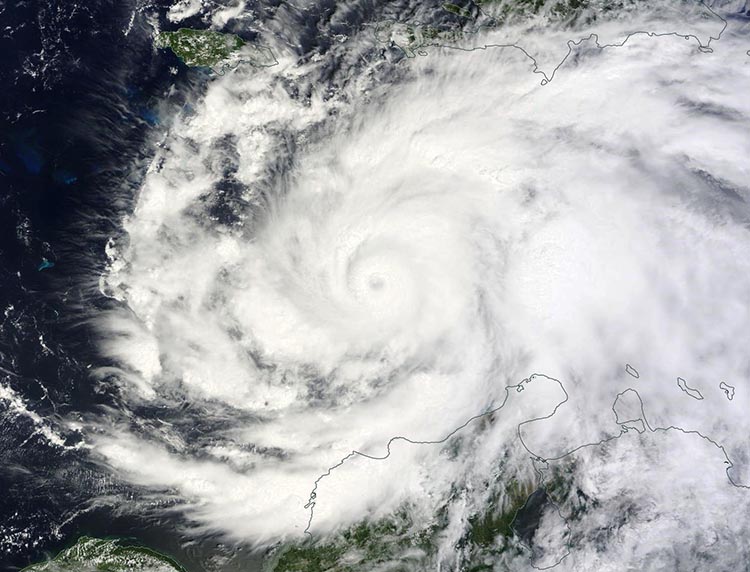|
wiAs Category 4 Hurricane Matthew strikes Jamaica and takes direct aim at Cuba and Haiti, extensive efforts are being made to safeguard lives and property. With winds over 130 mph (209km/hr.) the storm is expected to bring 40 inches (1,016 mm) of rain and severe coastal surge. As vital as these actions are, it is also important to understand that the state of a region’s environment can render it safer or at greater risk of harm when disaster strikes. Action taken now and in the aftermath can save lives, protect property, and keep the economy afloat.
Ecosystem health can ameliorate or exacerbate the effects of hurricanes, during the event itself and several days or weeks after the event has passed. Through ecosystem-based disaster risk reduction we’ve learned a great deal about when and how ecosystems affect risks. Here are some lessons learned for communities and responders to keep in mind to help safeguard communities and identify places that may have different or additional risks. Ecosystem health can ameliorate or exacerbate the effects of hurricanes during the event itself, and for several days or weeks after the storm has passed. The consequences for life and property have often been devastating. Through ecosystem based disaster risk reduction we’ve learned a great deal about when and how ecosystems affect risks, but these factors are not yet mainstreamed into disaster management. Here are some lessons learned for entities and responders to use now in order to help safeguard communities and identify places that may have additional risks. Deforestation increases the risk of flash floods and mudslides. Mudslides can occur days or even weeks after a hurricane. In Haiti severe deforestation has left large areas vulnerable. Downstream communities, even those less affected by wind and storm surge, may be exposed. Be aware of these risks and know that they can continue for some time after the immediate danger has passed. In some communities stabilizing the soil and safeguarding villages or settlements from mudslides will be a higher post-storm priority. The confluence of rivers and sea is a dangerous zone in a hurricane. This is where storm surge meets raging river floodwaters. Risks are exacerbated if there has been upstream slope deforestation or developments that reduce absorption capacity. The tragic loss of Petite Savanne in Dominica during tropical storm Erika in 2015 reminds us to pay close attention to these areas and to those who live there. Located on the coast at the mouth of the river, a combination of flooding and surge destroyed the historic town with loss of live. The remaining residents were permanently relocated to other places. Towns villages and critical infrastructures located on low-lying coastal zones or on flood plains are exposed to surge and flooding. Risks and impacts can be higher than expected if the ecosystems around them have been degraded and they cannot function as they once did. For communities, businesses, and emergency responders an awareness of the ecological role in hazards and disasters is a valuable tool in their emergency response toolbox. It can reduce immediate and short-term damage and help to prioritize recovery actions to benefit those affected. Incorporating ecosystems into disaster management will be even more critical as sea levels rise and climate change become more pronounced. Lives, businesses, and communities are at stake. During this hurricane and throughout the season we hope that all will stay safe and secure. PUBLISHED WITH PERMISSION FROM MY HUFFINGTON POST ARTICLE Published on New York Times Opinion Dotearth with acknowledgement to Andrew Revkin
0 Comments
Leave a Reply. |
AuthorDeborah Brosnan Archives
December 2019
|


 RSS Feed
RSS Feed